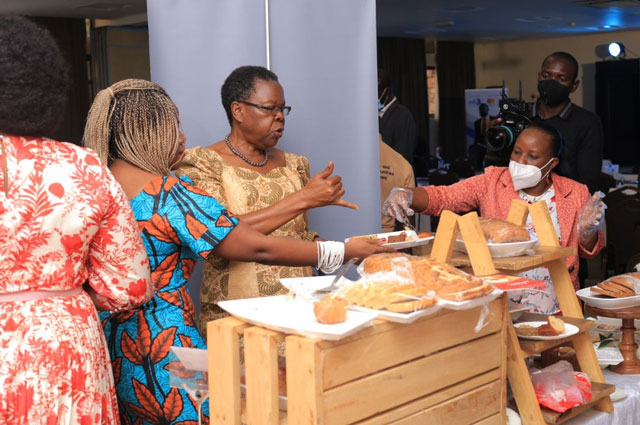
Kampala, Uganda | THE INDEPENDENT | Ugandans have been urged to step up domestic production and processing of wheat substitutes such as cassava and matooke.
Wheat prices in the country are on the rise as result of rise in fuel prices as well as the Russia-Ukraine war which hiked cost of importation of wheat, affecting the bakery and the confectionary industry.
“The current wheat crisis has sent me smiling for cassava, especially in the face of the current wheat prices. A lot of work is going on globally, a lot of research is being done and now we know what cassava can do,” said Prof Nape George William Otim.
Prof Otim, the Managing Director, Wind Wood Millers, was one of several speakers today at a dialogue in Kampala to address the rising wheat prices and opportunities for Import replacement along the wheat value chain.
The dialogue involving sector leaders was run under the theme: “Rising wheat prices: opportunities for import replacement.” Opportunities for innovation especially regarding domestic production of wheat substitutes such as cassava and matooke were unveiled.
The dialogue aimed to identify opportunities for innovation, especially in regard to domestic production of wheat or increased production of wheat flour substitutes such as cassava and matooke that Uganda can exploit in the face of the current crisis.
Former Agiculture Minister and current PSFU Vice Chairperson Victoria Ssekitoleko reiterated the role of PSFU to the participants in the dialogue.
“We are the Private Sector Foundation of Uganda and our job is to bring together the private sector of Uganda, work with them, support them and intervene on their behalf. Our dream is to have a clear platform where we have with all players and when one of us has issues, we can come together to overcome the challenge,” Ssekitoleko said.
“Today is for us to listen to each other, exchange views, hear from the different approaches, to learn who needs what. So that when we have this platform I am talking about, we as PSFU can serve as an information hub for anyone who needs it.”
‘’We are giving you time to talk to us. Tel us the problems you are facing how best we can solve them, also tell us what you want and how you want it done, we have the same goal so let’s work together towards it. There is need for a focus group to sit and have this discussion” she added.

Enhancing Lead Firm Structure for Youth Employment Program, a Youth Africa Works project being implemented by Private Sector Foundation Uganda (PSFU) in partnership with Mastercard Foundation (MCF), has also intervened in efforts to promote the substitution of wheat in investments of farmers, traders, processors, importers, and service providers.
The Intervention’s ultimate goal is to create dignified and fulfilling work for young women and men and contribute to the effort of lifting Ugandans out of poverty. Through the dialogue held, the project, alongside policy makers, was able to seek guidance from the business community to enable them lay capital as well as solutions from the different stakeholders on how to overcome the crisis.
“Let us take a leaf from Nigeria, it is the biggest cassava producer in Africa. They were spending billions of dollars importing wheat and decided they had to cut their imports by 30% in five years. That would save them a lot of money. What they did was to put a levy on wheat import and the income from that levy was used to finance the cassava growing program.” Prof Otim stressed.
Asha Batenga CEO Cake Shop said a campaign to promote local products needs to be stepped up.
“’If you told someone that their chapati is made of cassava, they will tell you ‘this is not what I have asked for, give me chapati’. We need to create awareness about this for the average Ugandan consumer. It makes it easier for people to buy in hence easing the value chain. The client will demand, we will demand, and the farmers will benefit but we need that awareness,” said Batenga.
 The Independent Uganda: You get the Truth we Pay the Price
The Independent Uganda: You get the Truth we Pay the Price


